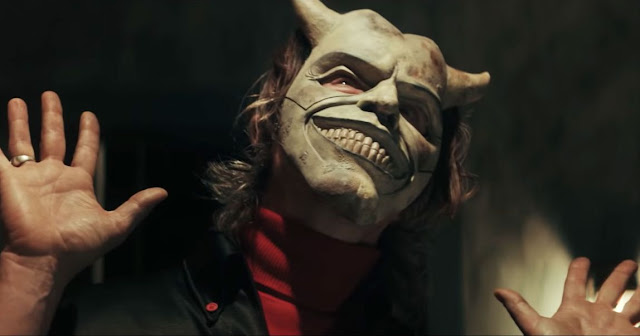When a film studio rolls out a new flick, they'd like people to see it. I understand this. At the same time, I'm not sure what ruins a film faster than the combination of excessive hype and inaccurate marketing. We've learned to see through the hype because most films receive this treatment. We aren't always as prepared for films that are marketed as something very different from what they are. This sets us up for disappointment.
I watched The Black Phone (2021) recently because I had heard good things about it. It received much better reviews than most horror movies do, and several of them commented about how scary it was. I really like Ethan Hawke, and I loved Sinister (2012), so I had high hopes.
The brief IMDb description was spot-on:
After being abducted by a child killer and locked in a soundproof basement, a 13-year-old boy starts receiving calls on a disconnected phone from the killer's previous victims.
My reactions to the film were mixed. It is billed as a horror film, but I think that's a big mistake that will disappoint many viewers. The film wasn't scary. It was a little creepy in a couple of places, but that was it. It had almost none of the elements that make for an effective horror film. But that wasn't a fatal flaw in this case because it wasn't a horror film. Go into it expecting a thriller, and you'll have a much better experience.
Warning: If you haven't seen this one yet and think you might want to, it is probably best to stop reading here so you don't learn too much.
The Black Phone was set in the late 1970s and nailed that period. The clothing, cars, home decor, and soundtrack all worked. Retro is still in when it comes to horror, and this one had a nostalgic Stranger Things vibe. Setting a child abduction story in that time period was a great choice. Those of us who were children then remember that there were a lot of abductions in suburban America. The image of a van cruising around residential neighborhoods taking children was not an unfamiliar one.
The filmmakers put in just enough time to develop their characters at the beginning. We got to see the boy who was at the center of the story in school, hanging out with his sister, and at home. This paid off by allowing the audience to care what happened to him. We see that he's being bullied, and we meet his abusive father. The casting was great all-around, though I thought the girl who played the sister stole the show. Every scene she was in left me wanting more.
The boy is abducted and placed in a soundproof basement by Ethan Hawke's character, the Grabber. We don't learn much about this character or why he does what he does. For most of the film, the most interesting thing about him was his mask and how it changed from scene to scene. Hawke was good but did not seem necessary for this character. He didn't do anything wrong; he just wasn't given enough to do.
Once in the basement, the boy receives phone calls on a disconnected phone. The calls are from the Grabber's previous victims and give the boy some ideas about what is in store for him. The ghost victims also give him tips about how he might escape before he's killed.
There were a few flaws along the way, but only one big one that bugged me. The boy didn't seem scared enough in that basement. Despite indications that he was to be brutally murdered by his abductor, he seemed more defiant than fearful. In films like this, we expect to see a transformation from fearful to empowered. Here, the filmmakers skipped the fear altogether. This seemed unrealistic, especially given everything we had seen the boy go through before his abduction.
It took me a while to figure out what to make of The Black Phone. I went into it expecting an unusually scary horror film. As a horror film, it was an absolute failure. It wasn't scary and did not seem like it had any intent to be. But what if it wasn't a horror film at all? What then? I enjoyed it. It was an interesting thriller that held my attention. Instead of hyping it at one of the best horror movies of the decade, it deserves to be seen on its own terms.
This post contains Amazon.com affiliate links, and I receive small commissions for purchases made through these links. This is one of the ways readers can support Atheist Revolution.

